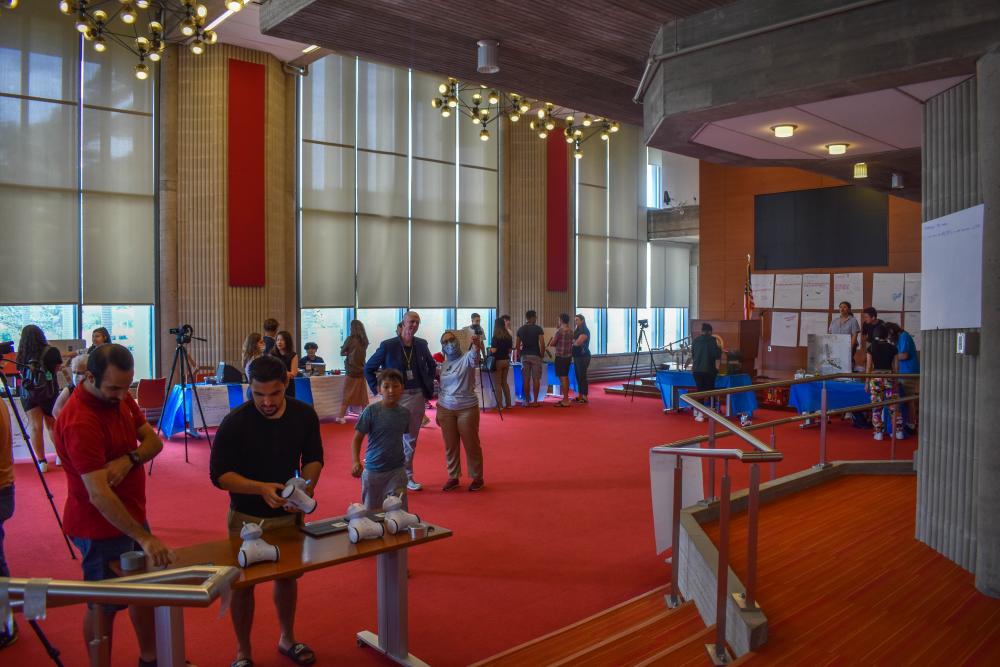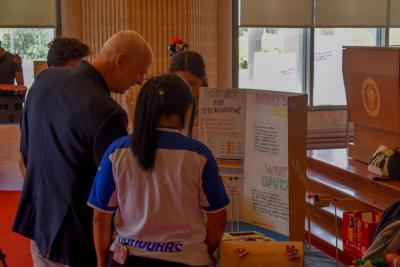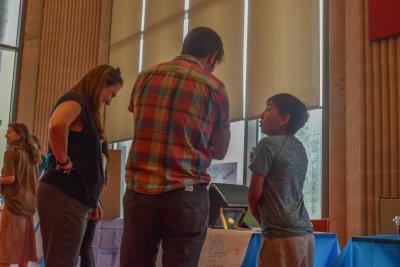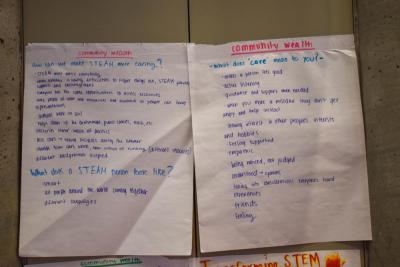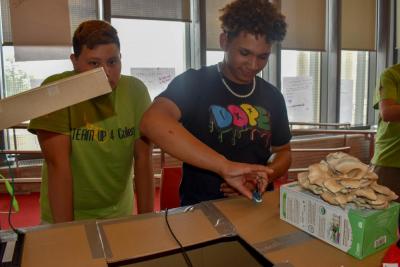Urban youth learn the universal language is STEM at UMass Dartmouth
For a brief moment on Friday, UMass Dartmouth’s Claire T. Carney Library was a model for the future of the South Coast.
Inside the room were self-sufficient windmills, greenhouses, and robots used by some of the brightest young minds in the region, all as part of the university’s STEAM Your Way 2 College summer camp.
The program is supported by a five-year grant from National Science Foundation and other federal agencies to research the importance of positive language and science identity development in multilingual communities in Fall River and New Bedford.
Professor Shakhnoza Kayumova, who leads the program, noted that many urban youth don’t tend to explore STEM fields due to language barriers and placements into English classes rather than math or science. At the camps, students are able to learn the scientific process through their home languages of Portuguese and Spanish.
“This allows them to see themselves as the future scientists of this region,” she said.
During the two week-long camps, students work with UMass Dartmouth professors, graduate students, youth mentors, and other students in hands-on science experiments.
“It’s very high-level work,” Kayumova said. “They learn from PhDs and try to recreate that in the classroom here.”
At this year’s camp, which is the final one under the grant, the students had to tackle creating a cleaner and more sustainable South Coast with models of smarter cities.
The kids were first presented with a short video from camp instructor and New Bedford High teacher Diana Cost on the Dust Bowl.
“No sound, no words,” she said. “They watched it and then provided models for what was going on.”
From there, the kids were taught about composting and ways to enrich dead soil by using mushrooms.
“It’s about making our dirt cleaner,” said New Bedford student Kevin Aguilar, 14, who hopes to attend M.I.T. in the near future. “Our soil is bad, we have to find other ways to grow stuff.”
The way the mushrooms help, Aguilar explained, is that they are able to break down organic matter into nutrients that plants can use.
Students also looked at ways to bring clean water to their communities.
Gaen Da Silva, a 15-year-old from Fall River, worked on a model of using wind to someday power water purification systems that would go into buildings close to the Taunton River.
This, he said, could also help increase urban gardening in places that aren’t as close to a grocery store or farmer’s market.
Students also created small greenhouses that can be monitored 365 days a year from sensors they created.
“And they did all of this themselves,” Cost said.
Another 21st century issue the students learned was cybersecurity, something that especially intrigued 11-year-old Murod Achilov, Kayumova’s son.
His favorite aspect was learning about computer and phone applications that could fight back against online scammers by checking incoming calls for the audio fingerprints of spammers, and shutting them down before the phone even rings.
Those numbers are then saved in the app’s database to block that number from ever calling again.
“It protects a lot of your things,” he said.
Another cybersecurity interest was using a firewall or virtual private network to safeguard data if a user accidentally clicks on a suspicious link.
“You click that link and then, wow, you have malware,” Achilov said. “With a firewall it’s… boom, Wakanda forever! We will not let you down.”
While the camps have now run their course, many of the students said they are excited to experiment more in the future.
“It’s been so helpful,” said New Bedford 14-year-old Keily Castro. “We learned so many things here we wouldn’t normally in school.”



